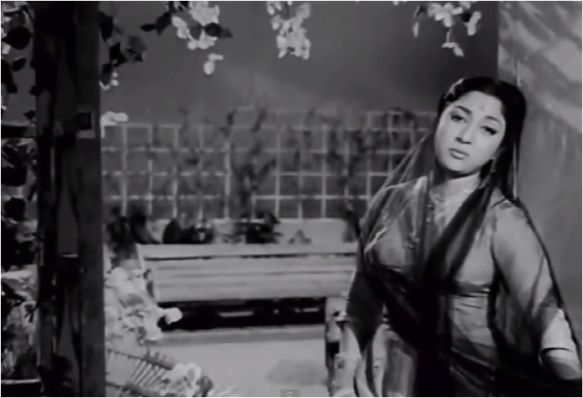
Mala Sinha experiences the pain of rejection in Anpadh (1962) from her husband Dharmendra due to her illiteracy.
As a sequel to our previous post on “aap ki nazaro.n samjhaa,” I have provided an English translation and glossary for another memorable ghazal from Anpadh (1962): “hai isii me.n pyaar kii aabhruu.” As a quick refresher, Anpadh narrates the story of a wealthy but illiterate woman (played by Mala Sinha) who is married off to an educated gentleman (played by Dharmendra). When Dharmendra asks Mala to recite a poem for him for her on their wedding night, she is compelled to reveal her darkest secret: her parents never taught her how to read or write. After hearing this, Dharmendra is furious that his parents lured into arranging his marriage to an uneducated woman because of the large dowry. As he spurns Mala for her lack of education, she expresses her sadness through this song, which was composed by Madan Mohan and penned by Raja Mehndi Ali Khan.
I’ll be the first to admit that these lyrics are a tad excessive in the drama department, but this is exactly the kind of song that you need when you’re in the mood to wallow. The essence of heartache is and the pain of rejection are illustrated beautifully in these words, so listening to a song like this can really hit the spot when you’re love-sick and need to get that sulking out of your system. Although one can find beauty in the lyrics, it is difficult to overlook that this ghazal also carries an underlying subtext of misogyny that reflects societal attitudes of the time. Take, for instance, the mukhDaa where Mala proclaims that she finds pride in her beloved’s cruelty: “hai isii me.n pyaar kii aabhruu / wah jafaa kare, mai.n vafaa karuu.n” (In this, I find the pride of love: he is cruel to me, yet I remain faithful to him). You won’t (and shouldn’t!) find such a line sung by the heroines in the Bollywood industry today.
Even if the lyrics for this song are too much for you to handle, I am certain that you can appreciate this song for its musical value. Madan Mohan has composed an evergreen melody that tugs at your heartstrings, and Lata Mangeshkar pulls through with a winning rendition. As an aside, I thought that I would share an alternate version of this song rendered by Madan Mohan himself using a different tune. This alternate melody was not used in the film, and I am guessing that was because it sounds too happy to suit the melancholic nature of these lyrics. Take a listen to both versions for yourself, and enjoy the translation and glossary that we have provided below! Requests for future posts, as always, should be e-mailed to themrandmrs55@gmail.com.

The intensity of Mala’s pain depicted in this song highlights the urgency of Anpadh‘s message about the need educate Indian girls.
Hai Isi Mein Pyar Ki Abhroo: Lyrics and Translation
hai isii me.n pyaar kii aabhruu
In this, I find the pride of love:
wah jafaa kare mai.n vafaa karuu.n
He is cruel to me, yet I remain faithful to him.
jo vafaa bhii kaam na aa sake
Although this love is in vain,
to wahii kahe ki mai.n kyaa karuu.n
It now dictates my actions.
mujhe gham bhii unkaa aziiz hai
Even the sadness I feel is dear to me,
ki unhii kii dii huii chiiz hai
Because it is something given to me by him.
yahii gham hai ab merii zindagii
This sadness has become my life,
ise kaise dil se judaa karuu.n?
how shall I separate it from my heart?
jo na ban sake mai.n wah baat huu.n
I am the matter that cannot be,
jo na khatm ho mai.n wah raat huu.n
And I am the night that cannot end.
yah likhaa hai mere nasiib mein
It is written in my destiny
yuu.n hii shamma ban ke jalaa karuu.n
That I shall burn here like a candle.
na kisii ke dil kii huu.n aarzuu
I am not the desire of anyone’s heart
na kisii nazar ki huu.n justajuu
Nor am I the object of anyone’s glances.
mai.n wah phuul huu.n jo udaas ho
I am that flower which is wilted.
na bahaar aaye to kyaa karuu.n?
If the spring does not arrive, what shall I do?
hai isii me.n pyaar kii aabhruu
In this, I find the pride of love.
Glossary
aabhruu: pride; jafaa: cruelty; vafaa: loyalty, love; aziiz: dear; judaa: separate; khatm: end; nasiib: destiny, fate; shamma: candle; aarzuu: desire; justajuu: quest, search; udaas: sullen, wilted.
